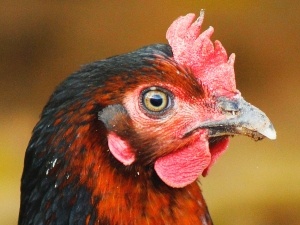
Traumatic events happen every day, to both humans and to chickens. We humans can choose to not deal with these traumatic events, and this can affect us in the future, or, we can choose to deal with them and learn to let them go.
If your chicken has suffered a traumatic event its behavior may suddenly change because of the event. This article explores traumatized chicken behaviors.
Table of Contents
Traumatized chicken behavior:
Chickens are very smart animals, they have to be in order to survive. Smarts were especially needed by chickens before humans started raising them.
Chickens can become traumatized by a predator attack or by an attack by other chickens, if your chicken suffered trauma then the bird may:
Stop laying eggs: A traumatized chicken may stop laying eggs for 2 months after the traumatic event. She may also refuse to leave the roost during this time.
Spend their days hiding: Your bird may become fearful of the outside world, become reluctant to move out of its comfort zone, and start to isolate itself from the world after suffering a traumatic situation
They become depressed: A traumatized chicken may develop depression. Traumatized birds may also exhibit mental stress that will carry on for weeks or even months after the incident happened.
Show signs of fear and distress: Traumatized chickens will become fearful of not only humans, but of other chickens as well. These birds may run at the slightest movement and may even become scared of their own shadow
Disinterest in food and water: Your traumatized chicken may stop being excited when food and water come around and may simply stay away when other birds are feeding. This will lead to weight loss and even starvation.
Lethargy: Not only will the lack of food and water make the bird lethargic, but the trauma will make the bird lethargic as well. The bird will become disinterested in doing any type of activity after its traumatic experience.
Staying on a very high roost: If your flock has been traumatized from an attack, all the birds will try their very best to keep from becoming attacked again.
Your birds may choose to stay up on a very high roost after the attack. The birds may do this for several weeks, 6/7 weeks if they feel the need to.
How to help a traumatized chicken:
Predator attacks on chickens can be quite dangerous.
When a predator bites a chicken, the animal’s teeth create an open puncture where bacteria, from the environment and from the attacker’s mouth, can enter and cause an infection in the bird’s body.
You’d need to treat the bird according to how severe the injury is and how healthy the bird is overall.
Start off by isolating the injured bird and keeping it in a safe and quiet place.
Make sure that there are no loud noises that may disturb the bird, make sure that the bird has comfortable bedding, and make sure that you limit any stress on the bird.
Clean the wound as soon as you can, flush the wound using copious amounts of a warm saline solution, vetericyn plus poultry care spray, or 0,05% chlorhexidine.
Antibiotics should be given to the bird if it was bitten by a carnivore like a dog or a cat. Getting the animal to the vet and having the vet examine the bird and prescribe broad-spectrum antibiotics and bird-friendly pain medications will also help.
Give the bird access to clean, fresh, water as well as food. Giving the bird electrolytes will help to stabilize its system and help it recover from shock
Make sure that the bird gets all the nutrients that it needs during its recovery, this will help the bird’s wounds recover as best as they can.
Keep the bird from losing weight by feeding it a nutrient-rich diet and be sure to add more protein to the bird’s diet as well.
Try to regain the trust of your bird by gently stroking it, talking softly to it, offering the bird healthy treats, and holding it securely to communicate to it that it is safe.
Conclusion
In conclusion, yes chickens can experience trauma, these animals are fairly complex and will show signs of trauma long after the traumatic experience has happened.
Nursing the bird back to good physical and mental health can mean the difference between life and death for the bird.
If you enjoyed this article then you may also be interested in other chicken related articles. Here are some articles that you may be interested in: Electrolytes And Probiotics For Chickens, How To Help A Sick Chicken Gain Weight, Do Chickens Feel Pain?, Lethargic Baby Chick With Closed Eyes, Chicken Having Trouble Walking And Standing

